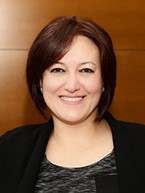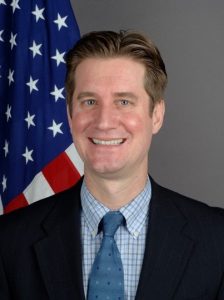Event recap
On February 3, 2022, the Atlantic Council IN TURKEY organized a webinar on the Russia-Ukraine conflict and its implications to Turkey. The virtual event brought together experts from the United States, Turkey, and Ukraine to discuss the situation and future of the Ukraine-Russia crisis, how it affects Turkey and Turkey’s role as a mediator country.
The event featured a distinguished panel composed ofDistinguished Energy Fellow for the Mediterranean Basin, Middle East, and Gulf Initiative at the Transatlantic Leadership Network, Debra Cagan; Carleton University, Centre in Modern Turkish Studies Senior Fellow Yevgeniya Gaber; and Director of EDAM’s Security and Defense Studies Program Can Kasapoğlu. The panel was moderated by Atlantic Council Global Energy Center and Atlantic Council IN TURKEY Nonresident Senior fellow Matthew J. Bryza and hosted by Atlantic Council IN TURKEY Senior Director Defne Arslan, who delivered welcoming remarks.
The panel took place on the same day as President Erdogan’s visit to Kyiv for a meeting with President Zelensky, where the leaders signed a free trade agreement and a strategic document to boost defense cooperation. This meeting was one of the highlighted topics of the panel, showcasing the position and role of Turkey in the conflict and bringing the discussion of how far Turkey is willing to go in aiding Ukraine, and to what extent Turkey can play a mediating role between the two powers.
In her opening remarks, Defne Arslan expressed that the Russian military build-up at the border of Ukraine has raised concerns in the US, NATO, and Turkey. Arslan reminded that Turkey has historically balanced a complex relationship with Russia, and, in the current tensions, Turkey has been keen to avoid conflict and encourage dialogue between all sides.
Debra Cagan gave an overview of the energy dimension of the Russia-Ukraine conflict and how Turkey’s energy relationship with Russia factors into the equation. Turkey’s imports of natural gas from Russia increased 63% last year. Russia has gone back to being the largest supplier of gas to the Turkish market in part due to high prices in the natural gas spot market, which increases the attractiveness of pipeline gas from Russia. Cagan drew a connection between the high oil and gas prices and Putin’s assertiveness, arguing Russia has more leverage than they had a year and a half ago. Concerning Ukraine defense strategy, Cagan highlighted that Ukraine does not have to possess battlespace superiority to deter Russia; it just needs the capability to hurt Russia and raise the cost of an invasion. Cagan argued that all sides have overlooked Turkey’s potential in the region, saying that EU, NATO, and Russia ignore Turkey at their own peril. Cagan told the audience that NATO has to look at Turkey more seriously in the Black Sea region and called for a new approach in dealing with NATO’s flank countries.
Dr. Yevgeniya Gaber expressed that Ukraine sees Turkey as a strategic partner. Turkey has shown diplomatic and military support to Ukraine during and before the crisis. She stated that the basis for this increasing cooperation are shared threats and interests. The growing military build-up of Russia in the Black Sea and the militarization of Crimea also poses a threat to Turkey. Gaber also focused on the strategy and importance of Turkish drones and their use for de-escalation instead of escalation; the drones are needed for reconnaissance, to gain intel and understand changing developments on the ground. But the game-changing role of drones is their political and diplomatic importance, Gaber argued. Gaber underlined that NATO needs to adopt a more coherent strategy by is needed in the Black Sea region. It should not focus on Ukraine as a particular case of Russian aggression but view it as part of a larger strategy to recreate the Soviet Union. Russia is seeking to gain an upper hand in the wide geography around the region.
Dr. Can Kasapoğlu focused on how Turkish drones can help and influence the conflict on Ukraine’s borders. Kasapoğlu stated that the impact of the drones depends on how things go unfold over the following weeks. However, what matters most is not the drones but actually the drone facilities. Turkey fighting with Turkish drones and Ukraine fighting with Turkish drones are different cases. Ukraine cannot produce these drones as effectively as Turkey, nor is it a producer of the smart munitions and critical subsystems which means that Ukraine does not have operational sovereignty in using the drones. Kasapoğlu also expressed that the Ukrainians need more intelligence support, more command control elements and more information superiority enabling elements if they are going to counter the Russians. Turkey should also be worried more than it is now about Russian efforts to power project in and from the Black Sea. Concerning Turkey’s position in the crisis, Kasapoğlu expressed that unlike in previous regional disagreements between Turkey and Russia in Syria, Libya and the South Caucasus, Turkey and Russia might not be able to decompartmentalize over a conflict in Ukraine and Turkey may be forced to pick a side between Russia and NATO.
In general, the panel emphasized Turkey’s position as a mediator in the Russia-Ukraine conflict. Turkey’s diplomatic and military aid to Ukraine remains an important deterrent factor. NATO should also approach the crisis not with a specific focus on Ukraine but as a crisis that impacts the whole region’s future. This new strategy and focus on the region should also lead to understanding the importance and capabilities of Turkey as a NATO member.
Concept
Register below for an Atlantic Council IN TURKEY public virtual event to discuss the tensions on the Ukrainian border its implications to Turkey on Thursday, February 3 at 9:00 a.m. EST / 5:00 p.m. Turkey time.
Tensions over Russia’s military buildup on the border with Ukraine are reaching a head as alarms increasingly are sounded over an imminent invasion. As the US and EU are stepping up talks negotiate and drawing up measures to deter an invasion, one NATO member, Turkey, stands uniquely positioned, with a long history of managing relations with both sides of the Russia-Ukraine conflict.
Cooperation with Russia on trade and energy is a necessity for Turkey but it has also shown a willingness to simultaneously compete, despite a seemingly asymmetrical power balance, in arenas from Syria, Libya, and the Caucasus. Turkey and Russia have been careful to compartmentalize areas of competition since a rapprochement in 2016. Despite advances in energy storage and LNG capacity, Turkey remains heavily reliant on Russian natural gas, which composes 34% of its imports, which is especially pressing as Turkey faces a winter of power cuts.
Since the Ukrainian revolution, Turkey has cultivated an increasingly close strategic partnership with Ukraine, to the chagrin of Russia, and rejected and condemned Russia’s annexation of Crimea, with which Turkey also has historical ties. Turkey traditionally developed close political, economic and defense relations former Soviet bloc countries in Eurasia and supported their integration into NATO such as with North Macedonia, Georgia, Azerbaijan and Ukraine. One of the drivers of Turkey’s relationship with Ukraine has been in defense cooperation, including the supply of domestically produced Turkish drones which has been singled out by Russia as one reason for raising the stakes.
In the event of an outbreak in violence, will Turkey be able to continue to balance its engagement in NATO, and relationships with Russia and Ukraine? Can Turkish mediation, leveraging ties with both sides, help play a role in resolving the crisis?
Speakers
Debra Cagan
Distinguished Energy Fellow, Mediterranean Basin, Middle East, and Gulf Initiative
Transatlantic Leadership Network
Yevgeniya Gaber
Senior Fellow, Centre in Modern Turkish Studies
Carleton University
Can Kasapoğlu
Director of Security and Defense Studies Program
EDAM
Moderated by
Matthew J. Bryza
Nonresident Senior Fellow, Atlantic Council IN TURKEY & Global Energy Center
Atlantic Council
Welcoming remarks by
Defne Arslan
Senior Director, Atlantic Council IN TURKEY
Atlantic Council
Relevant experts

The Atlantic Council in Turkey, which is in charge of the Turkey program, aims to promote and strengthen transatlantic engagement with the region by providing a high-level forum and pursuing programming to address the most important issues on energy, economics, security, and defense.

